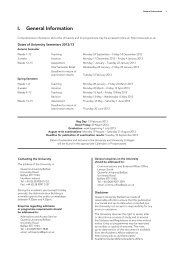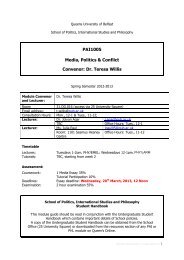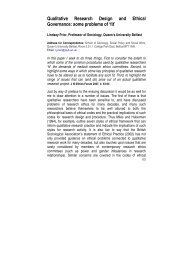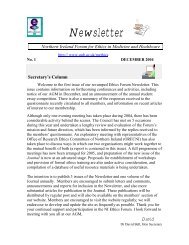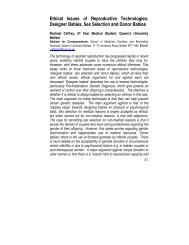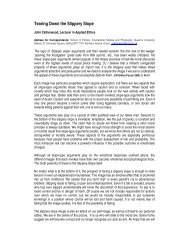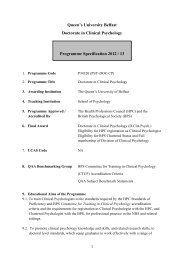Therapeutic Confidentiality and the Provision of Psychological ...
Therapeutic Confidentiality and the Provision of Psychological ...
Therapeutic Confidentiality and the Provision of Psychological ...
Create successful ePaper yourself
Turn your PDF publications into a flip-book with our unique Google optimized e-Paper software.
duties <strong>and</strong> responsibilities involved in caring for children than on an<br />
untrammelled notion <strong>of</strong> parental power <strong>and</strong> authority over children.<br />
In many sectors <strong>of</strong> <strong>the</strong> law, <strong>the</strong> rights <strong>and</strong> needs <strong>of</strong> children are now<br />
considered quite separately from <strong>the</strong> wishes <strong>and</strong> choices <strong>of</strong> <strong>the</strong>ir parents.<br />
This is true in <strong>the</strong> case <strong>of</strong> child protection, family proceedings <strong>and</strong> in<br />
complex decisions regarding medical treatment. Gillick builds on <strong>the</strong>se<br />
developments within <strong>the</strong> law in recognising that young people have a<br />
right to confidentiality, <strong>and</strong> to consent to medical treatment,<br />
independently <strong>of</strong> parental wishes, if <strong>the</strong>y have sufficient underst<strong>and</strong>ing <strong>of</strong><br />
<strong>the</strong> issues concerned.<br />
Review <strong>of</strong> <strong>the</strong> Mental Health Act<br />
Yet, in <strong>the</strong> ongoing consultation over reforming <strong>the</strong> Mental Health Act<br />
1983, <strong>the</strong> clash <strong>of</strong> pr<strong>of</strong>essional perspectives on Gillick against wider<br />
political priorities is all too clear. This split is revealed in <strong>the</strong> stances <strong>of</strong><br />
successive Green <strong>and</strong> White Papers in addressing <strong>the</strong> continuing<br />
problem <strong>of</strong> psychiatric provision for young people. The challenging<br />
recommendations <strong>of</strong> <strong>the</strong> Expert Committee for <strong>the</strong> consultative Green<br />
Paper were actually to buttress <strong>the</strong> Gillick principle, ra<strong>the</strong>r than to sound<br />
fur<strong>the</strong>r retreat. The Expert Committee favoured a clear recognition <strong>of</strong> 16<br />
as <strong>the</strong> threshold for capacity for making treatment decisions, with, more<br />
controversially, a rebuttable presumption <strong>of</strong> children's capacity for<br />
consent from an age as low as 10 or 12 (DoH, 1999) 4 . The Mental<br />
Health Act Commission has also recommended that existing case law on<br />
Gillick be given clearer legal status via statute (MHAC, 1999) 9 . This<br />
would presumably be on <strong>the</strong> lines <strong>of</strong> Scottish legislation, such as <strong>the</strong> Age<br />
<strong>of</strong> Legal Capacity (Scotl<strong>and</strong>) Act 1991.<br />
These innovative proposals have, unfortunately, been ducked in <strong>the</strong><br />
Government's response in <strong>the</strong> White Paper. It seems that <strong>the</strong>ir intention<br />
is simply to hold <strong>the</strong> line on Gillick, confusing as it may be to many<br />
42



